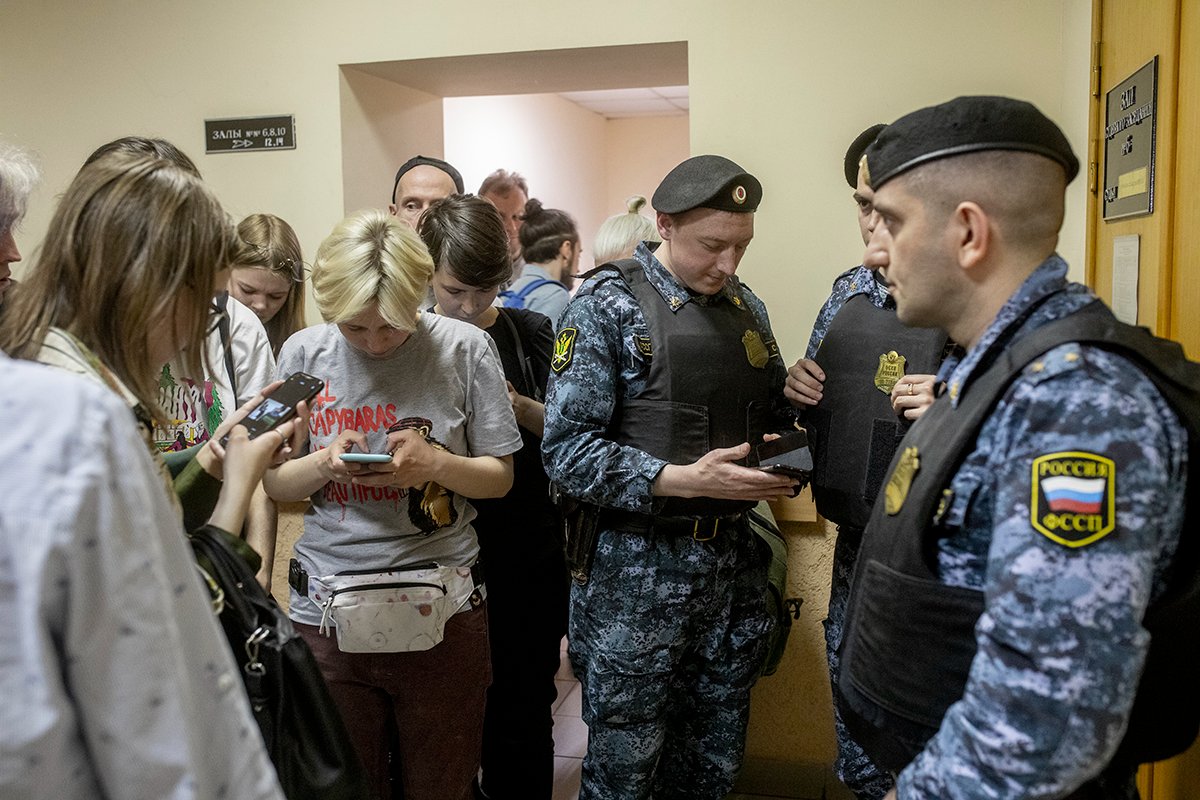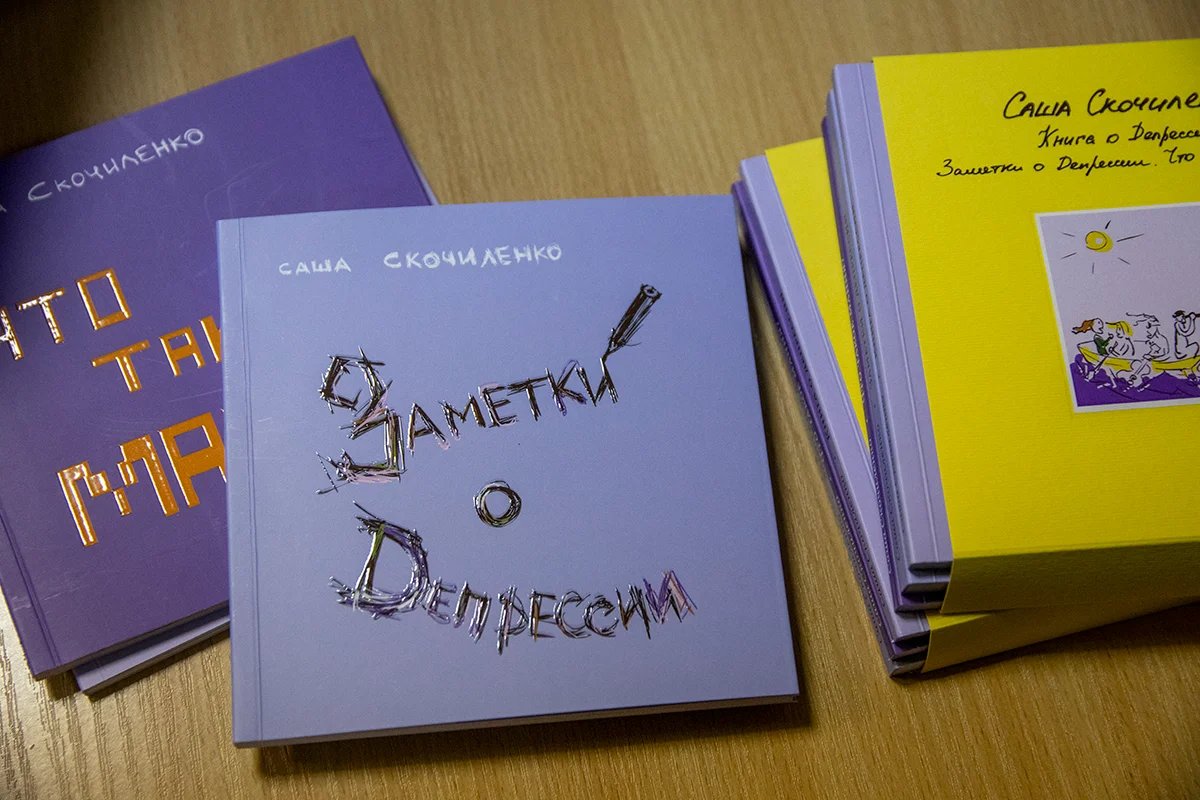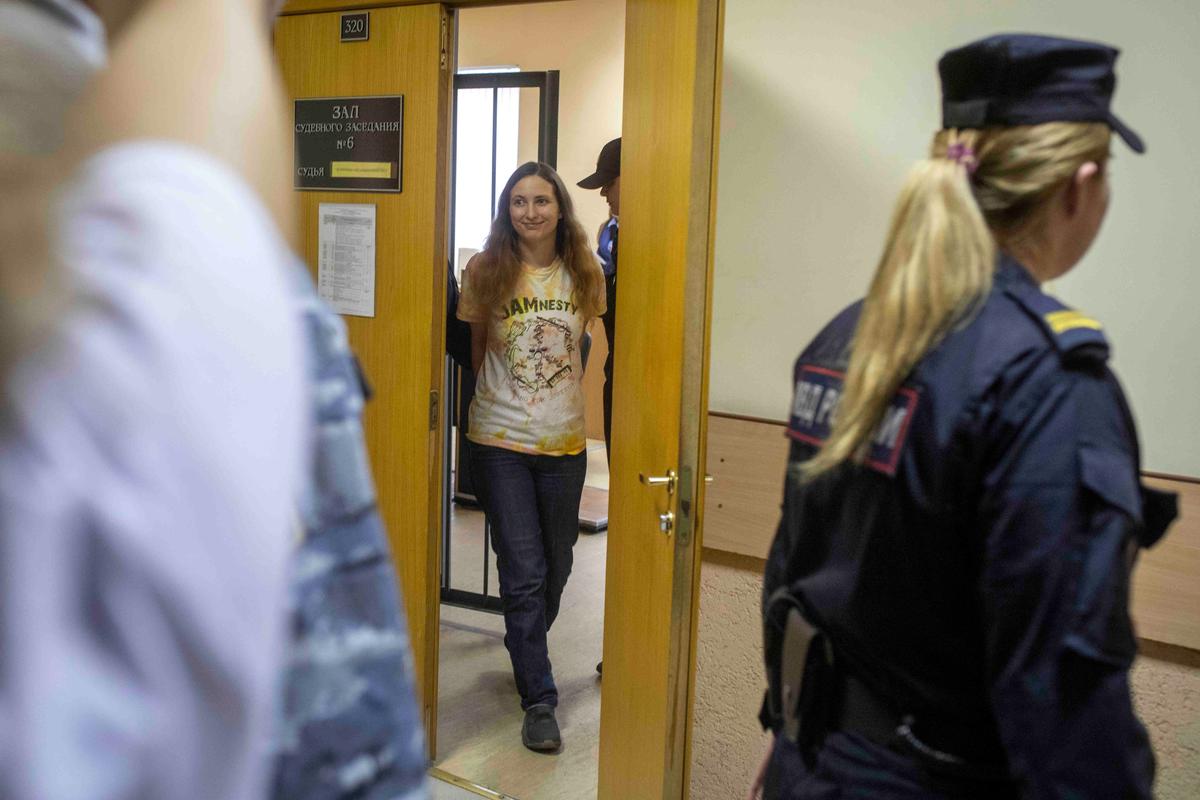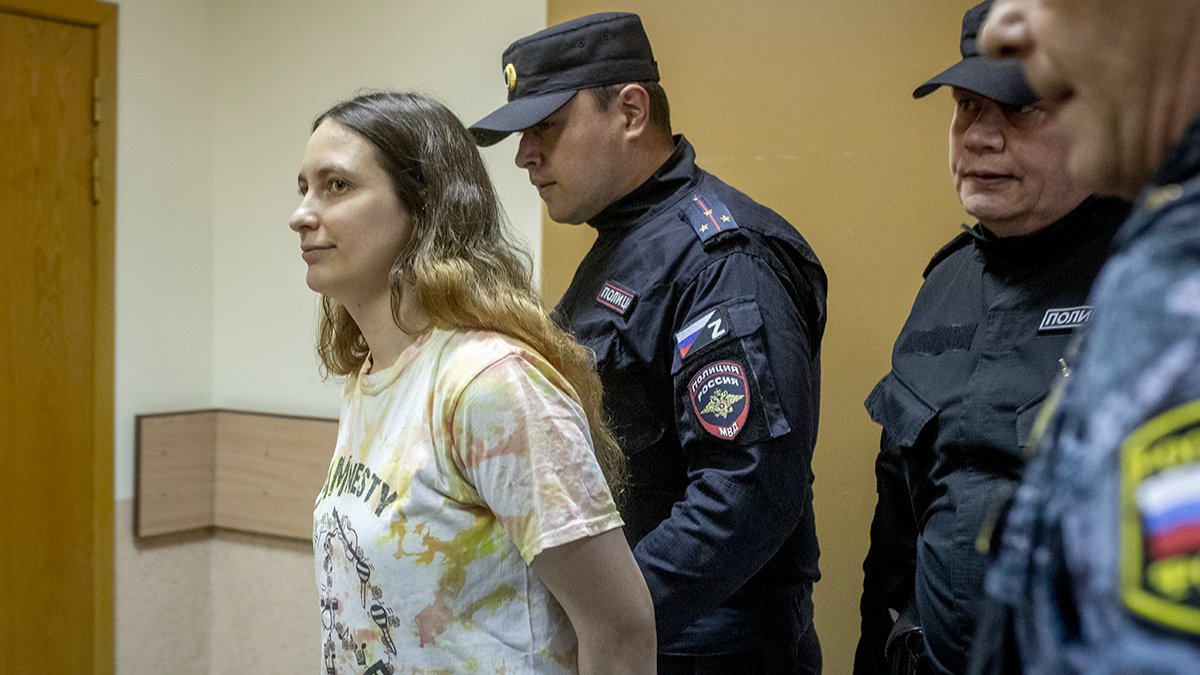On 13 June, in a St. Petersburg courtroom, the defence team of Alexandra Skochilenko, accused of spreading “fake news” about the Russian army, was finally given the floor after six months of trial proceedings.
Alexandra’s lawyers began presenting proof of her innocence. They weren’t able to question the prosecution’s experts, as they both failed to show up to the court hearing, saying that they had both ended up in a hospital. But the defence still has a lot of unanswered questions towards the experts. They are now planning on asking them during the next hearing — on 22 June.
Pieces of paper lead to criminal charges
Sasha (short for Alexandra) Skochilenko is an artist, musician, and creator of comics tackling mental health. In March 2022, she replaced the price tags at a local supermarket with messages about the war in Ukraine:
- “The Russian army bombed an art school in Mariupol. Around 400 people were hiding inside”;
- “Russian conscripts are being sent to Ukraine. The price of this war is the lives of our children”;
- “In the first three days, 4,300 Russian soldiers were killed. Why don’t they show it on TV?”;
- “Putin has been lying to us from our TV screens for 20 years. Now we’re prepared to justify the war and pointless deaths”;
- “My great grandfather did not fight in WWII for four years so that Russia could become a fascist state and attack Ukraine.”
These little pieces of paper, which didn’t really harm anyone, made Sasha a target for Russian law enforcement. A criminal case was initiated against Skochilenko on “public dissemination of deliberately false information about the use of the Russian Armed Forces under the guise of reliable messages… on the grounds of political, ideological, racial, national, or religious hatred or enmity, or on the grounds of hatred or enmity towards a social group”. The woman is facing up to 10 years behind bars.
As of today, Alexandra has spent over a year in a pre-trial detention facility, which puts her in mortal danger because of her chronic illnesses (bipolar disorder, coeliac disease, and a heart condition). Her doctors have said so several times; Alexandra has also complained that being held in a cell is taking a toll on her.
“The conditions in the detention facility are really damaging to my physical and mental health,” Sasha admitted almost a year after her arrest during one of the court hearings. “Under house arrest, I’d be able to follow a diet and undergo treatment.”
“I have no reason not to follow court orders. The process I’m involved in is a historic one, and I am greatly motivated to see what the result will be.”
However, nothing made an impact on the judge Oxana Demyasheva — Skochilenko is still being held in the detention facility, she is brought in for all the hearings in handcuffs and under heavy police escort.

Photo: Telegram
Reading lessons in court
As Novaya Gazeta Europe previously reported, the Skochilenko trial began on 15 December 2022. From January to March, the prosecution provided proof of the artist’s guilt. The proceedings were both a sad and funny affair.
The senior assistant to the prosecutor Irina Nikandrova started off presenting written evidence. She wasn’t at all fazed by the presence of foreign consulates representatives (from Germany, the Netherlands, Norway, Poland, Slovakia, Finland, Sweden, Switzerland) in the courtroom. Nikandrova presented work instructions for supermarket employees as “evidence of a crime” — those featured price tags, rules of conduct in case of fire and emergency, and other “valuable” documents.

Inside the court building in St. Petersburg during a court hearing on Sasha Skochilenko’s case, 24 May 2023. Photo: Igor Selivanov
Sasha’s lawyers expressed their indignation several times: what do a baker’s job description or a security guard’s work schedule have to do with Skochilenko’s charges?
“The state prosecution still hasn’t provided one piece of proof of Skochilenko’s guilt, and that makes sense: there isn’t any,” the woman’s lawyer Yury Novolodsky sums it up.
“Alexandra’s actions could be considered a crime only if the prosecution was able to prove that Sasha had been aware that the information she had been spreading was false at the moment of dissemination. But the prosecution is finding it very difficult to prove this fact. For example, Nikandrova doesn’t even realise that by disclosing the woman’s phone messages (very personal ones), not only did she not provide any proof of Skochilenko’s guilt but provided, unwittingly, proof of her innocence: Sasha’s actions were not based on her spreading deliberately false information.”
“She really believed that the things she was sharing were the truth. The criminal case is fabricated, and everyone sees it at this point — not just lawyers.”
Witness gone rogue
On 22 March, the prosecution’s witnesses were heard in court. One of them was Sasha’s childhood friend — 34-year-old Alexey Nikolaev (Skochilenko was arrested in his flat in April 2022). In the courtroom, Alexey said that law enforcement officers used his Telegram account without his consent to send Sasha a message asking her to come to his place immediately because he needed help. The woman rushed to help her friend and was arrested.
Nikolaev’s testimony in the court and the protocol of his interrogation by the investigator barely matched up. The document states: “I think that Alexandra Skochilenko committed the aforementioned actions (placed the anti-war price tags in the supermarket) because this is her way of condemning political actions of the Russian Federation, fighting the state”. During the court hearing, however, Alexey said that he “didn’t use those words”.

Alexandra Skochilenko’s books. Photo: Igor Selivanov
“I was agitated during the interrogation,” Nikolaev admitted. “Because law enforcement employees tried to break my door in at 8 AM, and then they arrested my childhood friend.”
“I don’t remember what I was saying. I don’t remember signing the protocol. I was testifying without a lawyer present. I made a stupid mistake.”
Nikandrova said only one thing in response: “Nevertheless, this is the protocol of your interrogation.”
After the hearing, lawyer Novolodsky clarified what that meant:
“The judge will now be able to choose and write in the ruling: I believe the testimony the witness gave during the pre-trial interrogation instead of the one during the court hearing. Now the interrogations in the case say just what the prosecution needed.”
Linguistic analysis
The case against Skochilenko is built on a linguistic analysis. And this analysis is questionable: the experts verified whether the statements printed on the price tags were true, which they don’t have the competence to do.
The prosecution invited two experts, employees of the St. Petersburg State University Expertise Centre Anastasia Grishanina and Olga Safonova. The defence called in an independent one — Svetlana Drugoveyko-Dolzhanskaya, who is also a collaborator of the Expertise Centre.
Their opinions on the analysis conducted during the investigation are vastly different.

Photo: Igor Selivanov
Anastasia Grishanina and Olga Safonova were called in to testify for the first time on 2 May. But they failed to show up. Instead, the independent expert provided by the defence Svetlana Drugoveyko-Dolzhanskaya took the stand — she found countless violations in the prosecution’s linguistic analysis.
“The statements on Skochilenko’s price tags feature neither the discreditation of the army nor any ‘incitement of hatred and enmity’ towards any social group,” she concluded.
On 24 May, political scientist Olga Safonova showed up to a hearing after all. She said that “the management of the St. Petersburg State University Expertise Centre tasked the experts with verifying whether the facts [presented in the price tags] were accurate”.
Skochilenko’s lawyer Yury Novolodsky objected: “The accuracy of facts is verified either by the prosecutor or the court. An analysis is used to establish facts, not verify them. This is some kind of legal perversion.”
During the questioning, Safonova had to admit that her analysis featured misrepresentations, that she was not a qualified linguist, and that she could not assess whether Skochilenko’s words were “deliberately false”.
Sometimes Safonova said nothing at all in response to Skochilenko’s lawyers.
“What scientific methods did you use to establish that Skochilenko’s remarks were false? What’s false about them?” lawyer Yana Nepovinnova asked her. “Please explain. Don’t stay quiet. Alexandra is facing up to 10 years behind bars because of this conclusion!”
Obviously trying to save face, the assistant to the prosecutor Alexander Gladishev (who replaced Irina Nikandrova starting from 24 May) rose up and asked judge Oxana Demyasheva to postpone the hearing. The court granted the prosecution’s request. The trial was rescheduled to 13 June.
Dead-end for the prosecution
On 13 June, Sasha’s lawyers planned to finish speaking with the prosecution’s experts, however, the experts never showed up to the hearing, which was delayed by an hour. Later, it turned out that both of them had suddenly fallen ill.
Only then were Skochilenko’s defenders allowed to start presenting the proof of her innocence. They read out the statements by the St. Petersburg human rights commissioner Svetlana Agapitova and excerpts from articles by different media outlets (featuring BBC, Meduza, Interfax, TASS, Kommersant, and RBC) Alexandra used to find out information about the “special military operation” in Ukraine. She used some of the statements in her price tags. Sasha herself confirmed in court that’s what happened.
“Thus, we’re trying to convince the judge that the information received by Skochilenko wasn’t deliberately false to her knowledge,” lawyer Dmitry Gerasimov explained to Novaya-Europe later on. “She thought the information was accurate, because she was reading sources of information that she and many other people trust.”
Assistant to the prosecutor Alexander Gladishev emphasised that some of the sources are “foreign agents” that are not to be trusted. During the 13 June hearing, he asked:
“Did the defendant submit inquiries to the official state bodies, for example Russia’s Defence Ministry, to verify the information she replicated on the price tags?”
In response, lawyer Yana Nepovinnova presented an inquiry she sent to the Defence Ministry in December 2022 and the reply she received in January. In her inquiry, the lawyer asked to be told “how many Russian servicemen were killed on the territory of Ukraine during the special military operation” and “how many lives of Ukrainian civilians were taken by the special military operation”. The Russian ministry responded that “the information about the number of killed Russian servicemen is a state secret”, while it also “does not have reliable information on the number of killed Ukrainian citizens”.
“In essence, the Defence Ministry refused to answer my questions,” Sasha’s lawyer commented. “Which means neither Alexandra nor other individuals will be able to receive answers from the official structures. It’s unclear how they are supposed to verify information from the media then. This is proof that Sasha was convinced that the information she got from the media and reproduced on the price tags was accurate.”
The court hearing that took place on Tuesday, 13 June, can be considered the culmination of Skochilenko’s trial. Before, the defence had to refute the prosecution’s ludicrous arguments, but now the prosecution has to respond to the defence. This time, the representative of the prosecutor’s office just remained silent. The important thing is for him not to fall ill too by the time of the next hearing, on 22 June.
Join us in rebuilding Novaya Gazeta Europe
The Russian government has banned independent media. We were forced to leave our country in order to keep doing our job, telling our readers about what is going on Russia, Ukraine and Europe.
We will continue fighting against warfare and dictatorship. We believe that freedom of speech is the most efficient antidote against tyranny. Support us financially to help us fight for peace and freedom.
By clicking the Support button, you agree to the processing of your personal data.
To cancel a regular donation, please write to [email protected]

